|
|
|
Sort Order |
|
|
|
Items / Page
|
|
|
|
|
|
|
| Srl | Item |
| 1 |
ID:
116347
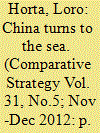

|
|
|
|
|
| Publication |
2012.
|
| Summary/Abstract |
As China's economy continues to expand, its policies and interests change and evolve. Today, Chinese economic and political interests span the globe from Africa to Latin America and the South Pacific. The country has grown more dependent on foreign energy sources in once marginal places such as Angola. Access to resources such as oil and natural gas are now at the forefront of Chinese security policy. While access to markets and regions where massive Chinese investment is occurring is equally important, these new challenges have led to some important changes in China's security and military posture, particularly its naval strategy. While diplomacy and economic power are still the most practical alternatives available to China to defend its interests, several Chinese military and civilian observers now openly discuss other alternatives, such as the eventuality of using military power to defend these interests. This is particularly visible in the People's Liberation Army Navy, where a more ambitious and confident maritime strategy is now being discussed.
|
|
|
|
|
|
|
|
|
|
|
|
|
|
|
|
| 2 |
ID:
149156


|
|
|
| 3 |
ID:
132529
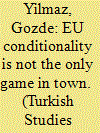

|
|
|
|
|
| Publication |
2014.
|
| Summary/Abstract |
Despite the weakened push by the European Union (EU) conditionality across time, Turkey's Europeanization process continues in a number of areas selectively. Focusing on such a puzzling trend, this article critically examines the role of EU conditionality on Turkey's Europeanization and unpacks domestic drivers of change. The article explores the impact of grassroots actors ?Turkish civil society organizations, business interest groups, media and political parties? on domestic change in the last decade and argues that continuing reforms in many areas in an era of limited EU-push are influenced by domestic actors.
|
|
|
|
|
|
|
|
|
|
|
|
|
|
|
|
| 4 |
ID:
137212
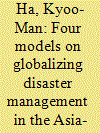

|
|
|
|
|
| Summary/Abstract |
This study contributes to disaster management in the Asia-Pacific region by examining four models: the United Nations/International Strategy for Disaster Reduction (UN/ISDR) professional coordination, US surveillance-oriented management, Korean copy-oriented efforts, and Indonesian homogenization-based action. Based on the comparative perspective, as well as basic concepts on global disaster management, the study cross-checks two features of global disaster management, namely, political interests and dynamic culture, and three comparative variables, namely, stakeholders, resources, and strategies, in each model. The biggest contribution of the study is that it more rigorously examines the comparative analytical framework of the four models. The key tenet is that the above-mentioned models have to address the continuous study of local culture and the job security of employees (UN/ISDR model), more partnership with private institutions and feasible training (US model), long-term international study and creative strategies (Korean model), and gender-sensitive management and information exchange (Indonesian model), by further utilizing both global education and networks.
|
|
|
|
|
|
|
|
|
|
|
|
|
|
|
|
| 5 |
ID:
113290
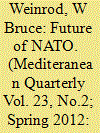

|
|
|
|
|
| Publication |
2012.
|
| Summary/Abstract |
Although fundamental questions concerning whether the North Atlantic Treaty Organization (NATO) is still relevant or necessary have emerged, NATO remains necessary for the protection of Western security and political interests. The international security environment remains unstable, and threats can arise far from NATO territory. In addition to its traditional role of defending members' territory, NATO is assuming new security-related missions. In addition, the alliance has developed "partnerships" with numerous nations throughout the world. These networks can enhance NATO's military capabilities and also encourage democracy. Thus, NATO has the potential to play a significant and constructive global security and political role in the twenty-first century.
|
|
|
|
|
|
|
|
|
|
|
|
|
|
|
|
| 6 |
ID:
133912
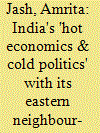

|
|
|
|
|
| Publication |
2014.
|
| Summary/Abstract |
India and China have made a significant stride in their bilateral relations which is exemplified in their 60 years of the 'Panchsheel Agreement of 1954'. Though India's relations with China has often been weighed down by the protracted boundary problem but the growing economic engagement has given a new high to the relationship. The growing economic interests between the two rapidly growing Asian giants significantly suggest that commerce can even flourish in the presence of very hostile relations. This unique characteristic of India's relations with China based on their convergent economic interests and divergent political interests posit a unique case study of both cooperation and conflict running parallel to each other.
|
|
|
|
|
|
|
|
|
|
|
|
|
|
|
|
| 7 |
ID:
178546
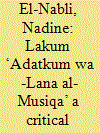

|
|
|
|
|
| Summary/Abstract |
In this article, I explore how the Lebanese band, Mashrou` Leila, enacts resistance, negotiations and subversions through their lyrical and musical outputs, drawing on notions of ‘disidentification’ and ‘creative reckoning’. Through their music, I engage with questions of how marginalized bodies and citizens creatively negotiate and resist hegemonic identity configurations and notions of belonging. To that end, I conduct a close reading of the band’s musical lyrics, contextualize them and analyse their implications politically, socially and emotionally, illustrating the complex process of negotiating various layers of imposed identities and political interests. I particularly focus on their use and (re)imagining of history, language, and pop culture references. I argue that through their creative reckoning with hegemonic notions of belonging and identity, the band creates cultural spaces that enable the (re)imagining of identities, particularly with regards to gender and sexual identities.
|
|
|
|
|
|
|
|
|
|
|
|
|
|
|
|
| 8 |
ID:
149042
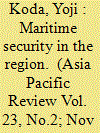

|
|
|
|
|
| Summary/Abstract |
This article examines the situations in the South China Sea (SCS) and East China Sea (ECS) and the reasons for recent political and strategic attention. As background it reviews the history of maritime activities in Asia where there was no real maritime Great Power with continuity. It then discusses the latest situations in the ECS around the Senkaku Islands, where China's Coast Guard vessels and fishing boats have made occasional incursions into Japanese waters, and the relatively-less understood Scarborough Shoal and the Pratas Islands in the SCS that have strategic significance in a future powerbalance in the SCS. The article then notes the US rebalance to Asia and the interpretation of the principle of Freedom of Navigation. It continues with the strategic and diplomatic measures and operational and tactical measures that Japan should take. It concludes noting that Japan and the US must prepare a wide range of measures in advance to regain and maintain maritime security and stability.
|
|
|
|
|
|
|
|
|
|
|
|
|
|
|
|
| 9 |
ID:
124986
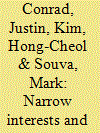

|
|
|
|
|
| Publication |
2013.
|
| Summary/Abstract |
Narrow interests and military resource allocation in autocratic regimes
Why do some autocratic states allocate more resources to the military than others? We contend that as narrow political interests have more influence on a leader, relative to broader political interests, a state's military burden increases. Further, we argue that two domestic factors are central to explaining the relative strength of narrow political interests for military spending, and therefore variation in state military burden. First, institutions that increase the cost of political participation reduce the influence of the median citizen, increasing the strength of narrow political interests and, concomitantly, military spending. Second, as a regime ages, narrow interests become more entrenched and the regime becomes less concerned about overthrow. In turn, older regimes spend more on their militaries. We test hypotheses from this argument by examining the military burden for all autocracies over the period 1950-2000. We find that variation in restrictions on political participation and the age of the regime are central to understanding differences in military spending among autocracies. Further, once these institutional features are taken into account, we find only modest support for the view that certain types of regimes spend more than others. What matters is not regime type but specific institutional features that affect the strength of narrow interests and vary across, and within, autocratic regimes.
|
|
|
|
|
|
|
|
|
|
|
|
|
|
|
|
| 10 |
ID:
122987
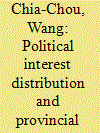

|
|
|
|
|
| Publication |
2013.
|
| Summary/Abstract |
The distribution of political interests in China after the 17th National Congress of the Communist Party of China indicates that the central government currently has greater control over the local government than it did during the 16th National Congress. Regarding the transition of political interests, the central government can successfully promote preferred policies, even when the policies damage local interests. This study develops a model for predicting local government responses to central policies, using the 2009 policy dispute over resuming the Labour Day Golden Week holiday as the validity criterion. It is found that use of the proposed analytical framework can reduce prediction errors by 33.2 per cent.
|
|
|
|
|
|
|
|
|
|
|
|
|
|
|
|
| 11 |
ID:
130724
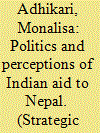

|
|
|
|
|
| Publication |
2014.
|
| Summary/Abstract |
India has significantly invested in Nepal's development through economic assistance since 1952. Despite deploying aid to win the hearts and minds of the people of Nepal, India has not entirely succeeded in doing so. Paradoxically, an analysis of Indian aid and gaps in the planning, processes, modalities and perceptions of India's motivation shows that it has possibly contributed to the fuelling of anti-India sentiments among the Nepalese population. Although Indian aid has not been refused, it has been resisted, and sceptical nationalist sentiments dominate perceptions of Indian aid in Nepal. Why is India not perceived as a major donor despite providing significant aid? Why do vested political and economic interests mar the public perception of Indian aid to Nepal? This article is an attempt to reconstruct the history of India's developmental aid to Nepal, outline the trends, shifting priorities and modalities as well offering a critical analysis of the perceptions of Indian aid. The article is limited to development aid and excludes military aid and investments.
|
|
|
|
|
|
|
|
|
|
|
|
|
|
|
|
| 12 |
ID:
133229
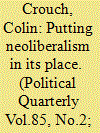

|
|
|
|
|
| Publication |
2014.
|
| Summary/Abstract |
Neoliberalism is not as popular as its opponents seem so much to fear; in democratic politics it nearly always hides behind other ideologies and policy types, as its essential message that we should pursue no goals that cannot be achieved through the market is intrinsically unattractive to the majority of people. Its power lies in the wealth of its key supporters, and in the difficulty of raising coordinated opposition to it among post-industrial populations that have little sense of their political interests. The main base for hope of change in this comes from the as yet unrealised potential of women's movements.
|
|
|
|
|
|
|
|
|
|
|
|
|
|
|
|
| 13 |
ID:
090802


|
|
|
|
|
| Publication |
2009.
|
| Summary/Abstract |
Theory on democracy and its consequences turns on how democracy influences behavior among politicians and the citizenry. Ultimately, the literature seeks to determine who benefits under democratic rules. This is our concern, posed in a context that allows us to address a classic question: does democracy favor large but diffuse segments of society over small but concentrated interests? We employ sectoral electricity consumption data for a panel of 733 country-years to examine democracy's impact on the distribution of electricity across three sectors that represent distinct political interests: industry, agriculture, and residential consumers. We find that in poorer countries democratization produces significant increases in the residential share of electricity relative to industry, suggesting sectors with less per capita financial clout, but a stronger voice in elections benefit under democracy. Unlike the large literatures on democracy's impact on the amounts of publicly provided goods, our results are among the first on the distribution of those goods.
|
|
|
|
|
|
|
|
|
|
|
|
|
|
|
|
|
|
|
|
|